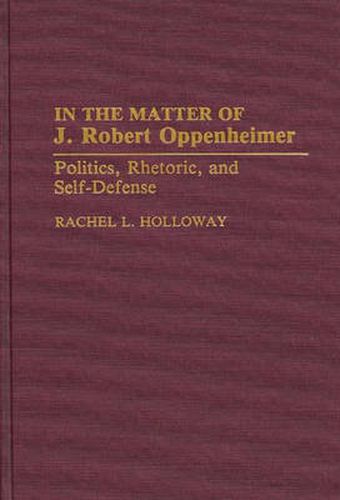Readings Newsletter
Become a Readings Member to make your shopping experience even easier.
Sign in or sign up for free!
You’re not far away from qualifying for FREE standard shipping within Australia
You’ve qualified for FREE standard shipping within Australia
The cart is loading…






In June 1954, the Atomic Energy Commission determined that J. Robert Oppenheimer, wartime director of the Manhattan Project and Father of the Atomic Bomb, was a security risk. Consequently, America’s most prominent scientist was removed from government service. In contrast to historical and political explanations of the Oppenheimer case, Holloway explores the role that rhetoric played in Oppenheimer’s demise. In doing so, the author draws attention to the symbolic nature of politics and character and highlights the significant interaction of political and scientific terminologies in American discourse.
Holloway’s analysis and evaluation suggest that the accusations against Oppenheimer used the most powerful terms of the mid-1950s–communism, progress, and science–to legitimize the government’s questionable action. Oppenheimer, for his part, failed to use his most strategic rhetorical resources in his defense, and therefore participated in his own ruin. Holloway highlights the rhetorical interaction among accusation, self-defense, and decision statements through a microscopic rhetorical analysis of the case’s five central documents. An original extension and refinement of Kenneth Burke’s cluster-agon method, which Holloway calls terminological algebra, is proposed as a systematic analytical tool consistent with Burke’s theories. Recommended for critics of rhetoric and political communication.
$9.00 standard shipping within Australia
FREE standard shipping within Australia for orders over $100.00
Express & International shipping calculated at checkout
In June 1954, the Atomic Energy Commission determined that J. Robert Oppenheimer, wartime director of the Manhattan Project and Father of the Atomic Bomb, was a security risk. Consequently, America’s most prominent scientist was removed from government service. In contrast to historical and political explanations of the Oppenheimer case, Holloway explores the role that rhetoric played in Oppenheimer’s demise. In doing so, the author draws attention to the symbolic nature of politics and character and highlights the significant interaction of political and scientific terminologies in American discourse.
Holloway’s analysis and evaluation suggest that the accusations against Oppenheimer used the most powerful terms of the mid-1950s–communism, progress, and science–to legitimize the government’s questionable action. Oppenheimer, for his part, failed to use his most strategic rhetorical resources in his defense, and therefore participated in his own ruin. Holloway highlights the rhetorical interaction among accusation, self-defense, and decision statements through a microscopic rhetorical analysis of the case’s five central documents. An original extension and refinement of Kenneth Burke’s cluster-agon method, which Holloway calls terminological algebra, is proposed as a systematic analytical tool consistent with Burke’s theories. Recommended for critics of rhetoric and political communication.